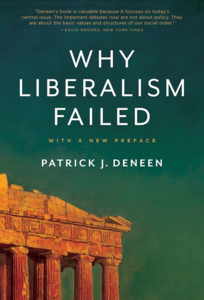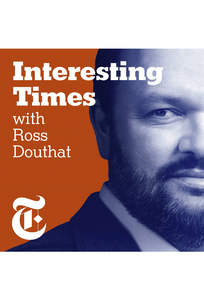Video
Article
Things fall apart; the centre cannot hold
Even those who rarely read poetry are likely to have come across this line from “The Second Coming" (1919): the collapse of the centre, the disintegration of all things—this apocalyptic mood created by William Butler Yeats (1865-1939) is regularly used in political commentary columns, book titles and articles. Not least to describe the state of US democracy. Even Oren Cass, founder of the think tank American Compass, cannot avoid referring to the Irish poet at the end of his book The New Conservatives, as many conservatives like to do time and again. In doing so, he breaks with what was considered conservative orthodoxy in economic policy until Trump's election: the belief in the market, globalisation, free trade and the idea that the prosperity of Americans is measured primarily by their consumer happiness. In The New Conservatives, Cass, his colleagues at American Compass and allied politicians outline a new direction—a conservative counterproposal that has caught the attention of both the media and Republicans at large.
Until recently, Oren Cass was known only to those who, like him, are obsessed with politics and are primarily concerned with recent developments in the conservative spectrum. For it was precisely to describe the latter’s condition that Yeats was frequently quoted: The centre did not hold. The centre, or consensus, that held America's conservative movement together until the beginning of the 21st century was an amalgam of contradictory but politically viable ideas. Since Ronald Reagan's election, the ideological formula for conservative success had been “market liberalism plus social conservatism = a voter coalition of libertarians, traditionalists and the religious right”. With the end of the Cold War, the anti-communist mission could no longer serve as a unifying force, but the conservative consensus remained intact—until Donald J. Trump demystified the old formula. It was the end of a market-liberal “orthodoxy” that had been taken for granted until then.
Despite his relatively young age of 39, Oren Cass has long been one of the representatives of the old conservative guard: with degrees from the exclusive Williams College and Harvard Law School, he has a privileged and privileging educational background that gave him early access to decision-makers. In 2012, he worked as a domestic policy advisor for Republican presidential candidate Mitt Romney—the very candidate who was said to have had too little empathy with the majority of Americans and to be completely out of touch. However, as Cass explains in interviews, it was Romney who drew his attention to the challenge posed by China and, even back then, urged him to find a solution for the eroding—or rather rusting—industries of the Midwest, the “rust belt”. Now everyone listens when Cass outlines his vision of populist economic policy – even the legendary Jon Stewart on The Daily Show.
This attention is mainly due to Cass's public support for Trump's tariff policy: in 2020, with the encouragement of Senators Marco Rubio, Josh Hawley and his good friend JD Vance, he founded the think tank American Compass, whose basic demands include a general import tariff of 10 per cent. While classic liberal critics suspect that this is based on a nostalgic “manufacturing delusio”’, as The Economist put it, Cass and his supporters believe in a paradigm shift. Back in 2018, he outlined his basic idea in The Once and Future Worker: A Vision for the Renewal of Work in America, arguing that the US should not measure its prosperity and growth solely in terms of gross domestic product (GDP). If GDP rises but a family can no longer support itself on one income, then something is fundamentally wrong.
Instead, Cass—and with him American Compass—advocates “productive pluralism”: “the economic and social conditions in which people of diverse abilities, priorities, and geographies, pursuing varied life paths, can form self-sufficient families and become contributors to their communities” (Oren Cass, The Once and Future Worker, New York; London: Encounter Books, 2018, p. 30). The focus is not on citizens as consumers, but as a productive force. Americans of all educational backgrounds should be able to find productive work in all regions of the country that allows them to support their families. Manufacturing industries play a key role in this because they are particularly, and historically have been, well suited to the “fly-over states”—and because they offer the best job prospects for workers without a college education. In concrete terms, this results in an economic policy that, to Europeans, sounds in part like former Christian or social democracy: recognition of the dignity of all work, a focus on living wages and thus also protection for domestic industries and workers, and the strengthening of trade unions and vocational training.
This vision is the focus of the recently published book The New Conservatives, which consists mainly of contributions by Cass. Some of the co-authors are particularly interesting: there are chapters by former “tariff czar” Robert Lighthizer and current Secretary of State Marco Rubio, who laments a failed China policy and calls for a new course. Although their contributions have already been published elsewhere, their involvement in the book project is impressive testimony to the influence of this young think tank. The priorities set by Cass and his colleagues are also telling. While conservatives normally focus on society as such, its values and norms or its relationship to the state, the self-declared New Conservatives are ultimately concerned above all with reorganising the market economy. The first part on “principles” is devoted entirely to economic policy issues—even the chapter on the state does not comment on democratic deficits and strengths. In the following section on “production”, there is a brief foray into foreign policy in the People's Republic of China, but this is embedded in considerations on globalisation and industrial policy.
After “Principles” and “Production”, the third and final part is entitled “People”. It deals with family policy (appropriately, one of only two female co-authors has her say here). But now everything becomes an economic policy problem. One almost seems to hear a Marxist echo that it is the basis and substructure that determine everything; ideas and values are—contrary to conservative belief—mere consequences.
Only when Cass quotes Yeats does he sound like an “old” conservative. However, he is someone who is very aware that the core of US conservatism is its constant renegotiation. Accordingly, what calls itself conservative does not have to be traditionally conservative—it would not be the first time that ideologies have been relabelled in the US. However, this will not happen overnight.
Not everyone in the “Grand Old Party” has already recalibrated their economic policy compass, as Oren Cass has discovered. He tried to allay fears that the tariff policy would lead to ruin and lamented the tax cuts in the infamous “Big Beautiful Bill”. But Cass will probably have read Yeats' poem beyond the famous line and therefore knows how to persevere:
The best lack all conviction, while the worst
Are full of passionate intensity.
Image: Adobe Stock / egoroff

Book
In 2018, Deneen published what I still consider to be the sharpest conservative diagnosis of our times. In my view, it is essential reading. Oren Cass often sounds like an echo of Deneen.

Podcast
There are more conservative podcasts than there is time to listen to them all. But Ross Douthat's “Interesting Times” is worth the 45 minutes a week. His guests are mostly conservatives, some very well-known such as Peter Thiel and Vice President JD Vance, others increasingly well- known such as Oren Cass, or (for many of us) yet to be discovered such as publisher Jonathan Keeperman.

Series
"We're steeped in liberal culture" – many conservatives claim that we are saturated with left-wing liberal culture. They say that everything, from films and television to music, is ‘woke’ and ‘out of touch’. However, some productions are particularly successful in reaching conservative audiences. The neo-Western series "Yellowstone", starring Kevin Costner, tells stories about family ties, loyalty, resistance to the state, the conflict between the urban coastal mentality and that of the north-west, and the connection to the land itself.